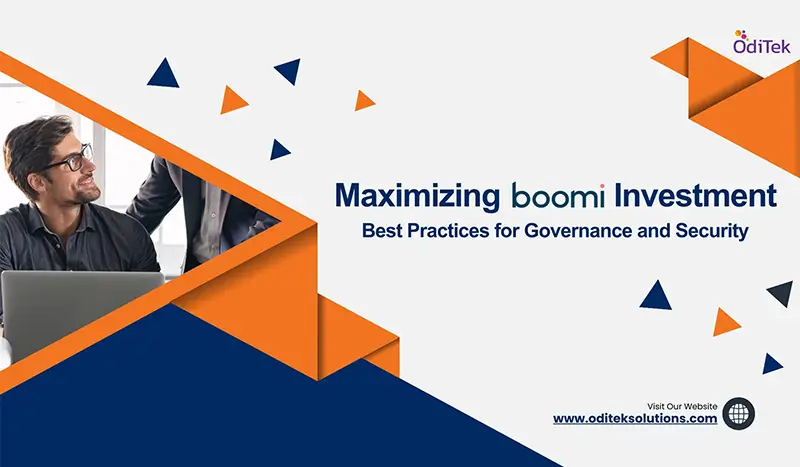Boomi, a leading integration platform, enables organizations to streamline their business processes by connecting disparate systems. However, ensuring governance and security in Boomi integrations is essential to protect sensitive data and comply with relevant regulations and policies. In this blog post, we will explore the best practices for maximizing your Boomi investment while prioritizing governance and security. By implementing these strategies, you can enhance data protection, maintain compliance, and optimize the performance of your Boomi integrations.
Maximize Return on your Boomi Salesforce Investment
In today’s thriving economy, it’s essential for businesses to engage with customers more frequently. Establishing processes that actively support ongoing customer relationship management has become a necessity rather than a luxury. Salesforce, as the industry’s leading CRM platform, offers businesses the means to boost customer loyalty, elevate sales operations, expand marketing capabilities, and seamlessly integrate with partner organizations up and down the supply chain.
Through effective integration, you can unlock the full potential of Salesforce and connect your CRM pipeline to vital business applications, enhancing overall value by sharing data across the organization.
Leveraging a cloud-native, low-code integration platform like Boomi, businesses can seamlessly connect Salesforce with other enterprise applications and API resources, enabling workflow automation and efficient data management. This amplifies Salesforce’s value for employees throughout the organization.
Understand the Importance of Governance and Security in Boomi Integrations Services
Governance and security are vital components of any integration strategy. They provide a framework to protect data integrity, maintain privacy, and enforce compliance with regulations such as GDPR, HIPAA, and PCI-DSS. By emphasizing governance and security in your Boomi integrations, you build trust with stakeholders and mitigate potential risks.
Identify and Classify Sensitive Data
Start by identifying and classifying sensitive data involved in your Boomi integration services. This includes personally identifiable information (PII), financial data, health records, and other confidential information. Categorize data based on its sensitivity to determine the level of security measures required.
Implement Role-Based Access Control (RBAC)
Implementing Role-Based Access Control (RBAC) in Dell Boomi involves configuring user roles, defining role permissions, creating role-based groups, configuring group permissions, assigning users to groups, testing and refining the implementation, and regularly reviewing and updating the roles and permissions. By implementing RBAC in Dell Boomi, organizations can ensure that users have the appropriate access and permissions based on their roles and responsibilities within the platform. This helps maintain data security, control access to sensitive components, and align user privileges with organizational requirements.
RBAC can be enhanced by integrating with an IAM system or utilizing SSO solutions for centralized user management. Regular reviews and updates to user roles and permissions are crucial to ensure continued alignment with changing organizational needs.
Implement a role-based access control model for efficient user permission management. Define roles and allocate suitable access privileges according to job responsibilities. Continuously assess and adjust user access rights to adhere to the principle of least privilege.
Secure Data Transmission
Ensure secure data transmission between systems by using encryption mechanisms such as SSL/TLS protocols. Leverage Boomi’s built-in security features, such as Secure Connector and Secure FTP, to protect data in transit. Implement strong encryption standards to safeguard data integrity.
Enforce Data Privacy and Protection Measures
Implement data privacy and protection measures within your Boomi integrations. This includes techniques such as data masking, encryption, and tokenization. Employ data anonymization methods where applicable, especially when working with test or non-production environments.
Monitor and Audit Integration Activities
Implement robust monitoring and auditing mechanisms in Boomi to track integration activities. Monitor data flows, log system events, and set up alerts for suspicious or unauthorized activities. Regularly review audit logs to identify potential security breaches and take prompt remedial actions.
Conduct Regular Security Assessments
Perform regular security assessments of your Boomi integrations to identify vulnerabilities and gaps. Conduct penetration testing, vulnerability scanning, and code reviews to proactively identify and address potential security risks. Regularly update and patch your Boomi components to mitigate any known security vulnerabilities.
Disaster Recovery and Business Continuity
Develop a comprehensive disaster recovery and business continuity plan for your Boomi integrations. Implement data backup and recovery mechanisms to ensure minimal data loss and downtime in the event of an unexpected incident. Test your disaster recovery plan regularly to validate its effectiveness.
Stay Informed About Regulatory Changes
Stay up to date with evolving regulations and changes in the compliance landscape. Regularly review and assess the impact of new regulations on your Boomi integrations. Engage legal and compliance experts to ensure your integrations remain compliant with relevant regulations and policies.
Provide Ongoing Training and Awareness
Cultivate a security-conscious culture within your team. Conduct routine training on best security practices, data privacy, and compliance protocols. Foster a proactive environment where employees are encouraged to promptly report any potential security incidents.
Conclusion
Maximizing your Boomi investment requires a strong focus on governance and security. By following these best practices, you can enhance the governance and security of your Boomi integrations, protect sensitive data, and ensure compliance with relevant regulations and policies. Prioritizing data privacy, implementing access controls, and enforcing encryption and monitoring mechanisms can ease down the processes.
OdiTek being a leading cloud integration company and a SI partner (System Integration) of boomi ensures top-notch security for Boomi integrations, covering authentication, encryption, and network security. We deliver cutting-edge integration solutions to help businesses achieve their goals.
Contact us today to learn more about our Boomi integration services!







